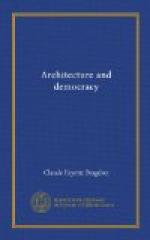Let us briefly pass in review the various terms of such an ascending series of symbols: members of one family, they might be called, since they follow a single line of descent.
Take gold: as a thing in itself, without any symbolical significance, it is a metallic element, having a characteristic yellow color, very heavy, very soft, the most ductile, malleable, and indestructible of metals. In its minted form it is the life force of the body economic, since on its abundance and free circulation the well-being of that body depends; it is that for which all men strive and contend, because without it they cannot comfortably live. This, then, is gold in its first and lowest symbolical aspect: a life principle, a motive force in human affairs. But it is not gold which has gained for man his lordship over nature; it is fire, the yellow gold, not of the earth, but of the air,—cities and civilizations, arts and industries, have ever followed the camp fire of the pioneer. Sunlight comes next in sequence—sunlight, which focussed in a burning glass, spontaneously produces flame. The world subsists on sunlight; all animate creation grows by it, and languishes without it, as the prosperity of cities waxes or wanes with the presence or absence of a supply of gold. The magnetic force of the sun, specialized as prana (which is not the breath which goes up and the breath which goes down, but that other, in which the two repose), fulfils the same function in the human body as does gold in civilization, sunlight in nature: its abundance makes for health, its meagreness for enervation. Higher than prana is the mind, that golden sceptre of man’s dominion, the Promethean gift of fire with which he menaces the empire of the gods. Higher still, in the soul, love is the motive force, the conqueror: a “heart of gold” is one warmed and lighted by love. Still other is the desire of the spirit, which no human affection satisfies, but truth only, the Golden Person, the Light of the World, the very Godhead itself. Thus there is earthy, airy, etheric gold; gold as intellect, gold as love, gold as truth; from the curse of the world, the cause of a thousand crimes, there ascends a Jacob’s Ladder of symbols to divinity itself, whereby men may learn that God works by sacrifice: that His universe is itself His broken body. As gold in the purse, fire on the forge, sunlight for the eyes, breath in the body, knowledge in the mind, love in the heart, and wisdom in the understanding, He draws all men unto Him, teaching them the wise use of wealth, the mastery over nature, the care of the body, the cultivation of the mind, the love of wife and child and neighbour, and, last lesson of all, He teaches them that in industry, in science, in art, in sympathy and understanding, He it is they are all the while knowing, loving, becoming; and that even when they flee Him, His are the wings—
“When me they fly, I am the wings.”




